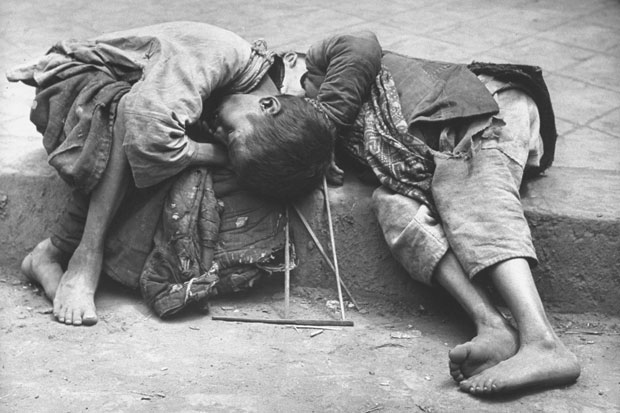I should begin this review, in the spirit of full disclosure, by admitting that I know the author very slightly. Something close to 14 years ago, we were on the same press freebie: a slap-up lunch in Paris courtesy of — was it? — LBC radio. Who knows? The ignominious occasion of our acquaintance isn’t the reason I mention it: rather that, somewhere on the Eurostar under the Channel, he and I fell into a conversation about the European Union. As I trotted out the usual boilerplate grumbles about sovereignty and bureaucratic opacity and the iniquities of the Common Fisheries Policy, he exclaimed so passionately in its favour that the conversation stayed with me. After all these years I of course paraphrase, but what he said was: ‘Yes, yes, but it is such a beautiful idea.’
You may — I imagine most Spectator readers will — think this intellectually nugatory, or indictably hippy-sounding, or both. But the combination of impatience with detail and deep feeling (this was an outbound conversation at about 10 a.m. so we were nearly sober) struck me. And reading this book — a snapshot of what was going on in four continents, but especially in Europe, in the year after the end of the second world war, by a man whose family fled Hungary as refugees when he was a child — I better understand where it came from.
There aren’t all that many laughs in 1946, and such as there are tend to be dark black. If anyone had the notion that the war coming to an end would cause a general improvement, they had it (at least in the short to medium term) quite wrong. Indeed, there was even a term minted for that particular stripe of disappointment. A 1946 study by British psychologists discovered that those freed from forced labour in the camps still seemed a bit grumpy about the state of the world. They were suffering, apparently, from ‘Liberation Complex’.
With the exception of the US — which, obviously, didn’t get bombed and ended the war much better off than it started — the political chaos and the human wreckage worldwide was astonishing. Greece was a basket case. Iran and Turkey were Cold War crucibles. China was in the grip of a power struggle between Mao Zedong and, if it were possible, the even less appealing Chiang Kai-Shek; not to mention starving after the retreating Japanese blew the dykes on the Yellow River and flooded three million acres of farmland. In Japan, newspapers were running advice columns with headlines such as ‘Let’s catch grasshoppers’ and ‘How to eat acorns’. And Germany was fucked: literally. Sebestyen’s account of the way the Red Army raped its way across Eastern Germany is too grisly to rehearse here in detail, but detail there is.
Economically, where do we begin? With the reparations process? The Red Army went about uprooting all and any German industry they could get their hands on, taking factories to bits, loading them onto trains and reassembling them in the Motherland. The western powers (who, less interested in light manufacturing, did the same thing with Germany’s intellectual talent) disapproved but weren’t in a position to make too much of a fuss.
The cigarette was a serious unit of currency. Currency, in many places, was not. China was bad: an economist quoted by Sebestyen had it that, ‘In 1940, 100 yuan bought a pig; in 1943 a chicken; in 1945 a fish; in 1946 an egg and in 1947 one third of a box of matches.’ Hungary was worse. Inflation ran at 158,000 per cent a day: one author ran to the nearest market to spend his advance on a chicken, a few veggies and a litre of olive oil because he knew it would have become worthless by the time he’d walked across the city.
The plight of displaced people — and their sheer numbers — gives Sebestyen one of his most powerful chapters. In Germany alone, 14–15 million people were homeless and fully a third of the housing stock had been destroyed. And amid all this chaos, the Allied powers were hell-bent on denazification, to be achieved, it was decided, by making people fill out forms. Emmy Goering, in Straubing prison while her husband awaited trial in Nuremberg, was asked to fill out one such: ‘Did you have a relative or a close friend with a high position in the Third Reich?’ ‘I can’t remember my husband’s titles any more.’ ‘Don’t worry. Just write Hermann Goering. We’ve got enough information on him already.’
Nor did doing for the Nazis put an end to ethnic cleansing: it simply set off a whole new round. German nationals outside Germany, and Russian nationals outside Russia, were repatriated with extreme prejudice. There were the informal beatings, expropriations, rapes and death-marches with which ethnic Germans were seen off by their former neighbours in the Sudetenland and elsewhere; and then there were the more by-the-book ways in which British and American governments knowingly sent Soviet refugees to their deaths. ‘Our troops find it not only shocking but incomprehensible,’ one American diplomat reported to his superiors, ‘when Soviet refugees targeted for extradition bite each other’s jugular veins rather than submit to repatriation.’
And, after everything everyone now knew about the camps, did anyone — just for once — give the Jews a break? Hell no: quite the opposite. The pogrom in Kielce — sparked when an eight-year-old truant in Central Poland claimed to have been abducted by local Jews and kept with other children in a basement (no basement existed; no other children were held) — claimed 42 lives. In Hungary, Poland and Slovakia, far more Jews were killed in the 12 months after the end of the war than in the 12 years before 1939. The most senior figures in the Catholic church flatly refused to condemn anti-Semitism. The right of Holocaust survivors, all over Eastern Europe, to return to their own homes was resisted.
Sebestyen quotes the sad, shrewd analysis of the Polish philosopher Stanislaw Ossowski: ‘Compassion is not the only imaginable response to a misfortune suffered by other people.’ Guilt, among the beneficiaries of that misfortune, can turn to hate:
Those whom fate has destined for annihilation easily can appear disgusting to others and be removed beyond the pale of human relations… if one person’s disaster benefits someone else, an urge appears to persuade oneself, and others, that the disaster was morally justified.
And the results of all this, as Sebestyen remarks, were that after the second world war, Europe was more ethnically homogeneous than it had been for many centuries, and would remain so until immigrants from outside the continent began to arrive in large numbers from the 1960s onwards. The Jews all but disappeared. The Germans were not wanted anywhere outside Germany. Vast populations had been forced to uproot in the biggest refugee crisis the world had ever seen. Hitler had dreamed of an ethnically pure Europe. Paradoxically, Germany’s defeat ensured that, by the end of 1946 his dream was, to a great extent, a reality.
This is an exceptionally involving and horrifying book. Sebestyen isn’t that much of a stylist, but heaven knows he can tell a story. His short chapters are full of sharp judgments, apt and really colourful quotations and (I mean this as a compliment) grindingly awful detail. Such little flares of light as there are shine all the brighter for the background. There are the moments of generosity or realpolitik — the US’s handling of Germany and Japan, for instance; and there are piercing bits of ground-level human detail, such as the extraordinary rates of ‘sexual irregularity’ in the camps for displaced persons: ‘Sex was not just a pleasure,’ writes a historian quoted by Sebestyen. ‘It was an act of defiance against extinction.’
Gee whiz. My dad was born in 1946. This was not — and it’s a virtue of this book that it makes you ponder on it — really all that long ago. To those of us who have grown up in peace and in ignorance and who have the luxury of thinking the Common Fisheries Policy a big deal, 1946 is if nothing else a useful prompt to pause — gratefully — for thought.
Got something to add? Join the discussion and comment below.
Get 10 issues for just $10
Subscribe to The Spectator Australia today for the next 10 magazine issues, plus full online access, for just $10.
Available from the Spectator Bookshop, £21 Tel: 08430 600033. Sam Leith is The Spectator’s next literary editor. He starts on Monday.
You might disagree with half of it, but you’ll enjoy reading all of it. Try your first month for free, then just $2 a week for the remainder of your first year.















Comments
Don't miss out
Join the conversation with other Spectator Australia readers. Subscribe to leave a comment.
SUBSCRIBEAlready a subscriber? Log in